 Engagements and weddings are the bread- and-butter of the jewellery industry – and there was no escaping the devastating impact of COVID-19 on the category.
Engagements and weddings are the bread- and-butter of the jewellery industry – and there was no escaping the devastating impact of COVID-19 on the category.
According to the Australian Bureau of Statistics (ABS), provisional data showed that between January and June 2020, a total of 37,813 marriages occurred in Australia – a 31.9 per cent decrease compared with the five-year average.
The decline in the number of marriages began in March, coinciding with the introduction of COVID-19 restrictions, and plummeted more than 70 per cent in April.
Chris Holdsworth, director Holdsworth Bros Jewellers, which has two stores in Melbourne, said, “During the first lockdown everyone was a bit bemused, so while many people had weddings and engagements planned, they simply put them off. Our sales – across the board – were deeply affected as stay-at- home orders prevented people from venturing out to shop.
“We worked hard on our online presence but found it couldn’t come close to replicating an in-store experience, and our engagement and wedding-related jewellery sales suffered.”
The trend was even more pronounced overseas, with approximately 80 per cent of engaged couples postponing their weddings in the US, according to the Association of Bridal Consultants.
Yet while wedding-associated businesses’ bottom lines bore the brunt in the first half of 2020 as couples postponed their big day, the vast majority of brides- and grooms-to-be rescheduled their ceremonies instead of cancelling.
At the same time, a proportion of those who managed to squeeze in a micro-weddings or elopements have begun planning larger celebrations with family and friends once the pandemic has completely eased.
The waiting game
A survey of more than 800 engaged women, conducted by online wedding services directory Wedded Wonderland, found that the most popular date-switches were May to October 2020, while those who had planned to tie the knot in July and August shifted their winter weddings to the same dates in 2021.
Indeed, postponements look set to create a bumper year for the bridal market.
Australian event planning website EasyWeddings predicts 145,000 weddings – an increase of 20 per cent on the five-year average of 115,591 – will take place in 2021.
It predicts a further 150,000 in 2022 due to the cumulative effect of delayed engagements and larger wedding celebrations, as well as easing of border restrictions and the assumed widespread availability of the COVID-19 vaccine.
The result is expected to boost the jewellery industry, with signs of recovery in the sector already visible across the board.
Maulin Shah, director of diamond supplier World Shiner – which has offices in NSW, Queensland, and Victoria – noted: “During COVID-19, couples went through a lot of changes, yet many still went ahead with engagements, and even weddings, albeit at a small scale, rather than a large scale.”
In NSW, Queensland, and Western Australia, jewellery demand was fairly consistent. In Victoria, we had the strict lockdown for three months and in that time, we received a lot of enquiries. Then almost as soon as the lockdown finished, around November and December, we saw an increase in demand.”
He added, “Now, in 2021, there is a steady demand for all kinds of jewellery, so we expect this to remain consistent.”
Chris Scanlan, director of RJ Scanlan & Co., which supplies Dora wedding rings, noted similar trends, telling Jeweller: “Thankfully, it seems that weddings are back on the agenda. With the easing of restrictions, the last three months have seen a big improvement in wedding ring sales.
“Couples that had put their weddings on hold are now heading back into stores so we have every reason to be hopeful that 2021 will be a much improved year for the category.”
Scanlan added, “I’ve had feedback from retailers that reduced guest lists and restrictions on overseas travel allowed their customers to spend more on their wedding rings.
“Being a Victorian-based business, we saw a downturn in sales, but the average sale price was up for most of the year so people’s spending priorities did shift slightly during the pandemic and it has continued into 2021.”
Retailers have noticed similar trends, with Melbourne-based Holdsworth remarking, “Trade has clearly improved across the board since November.”
He explains, “As limits lifted, we found people ventured back into the stores and bought wedding rings again. I think people are now confident Australia can get through this – and while you can’t be certain an interstate trip can go ahead or an event can happen as planned, people are accepting this is the new normal and uncertainty is part of life.”
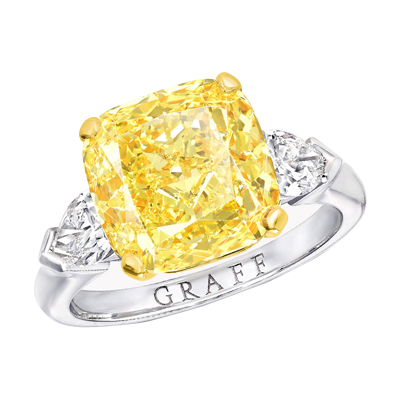 |
| Above: Graff |
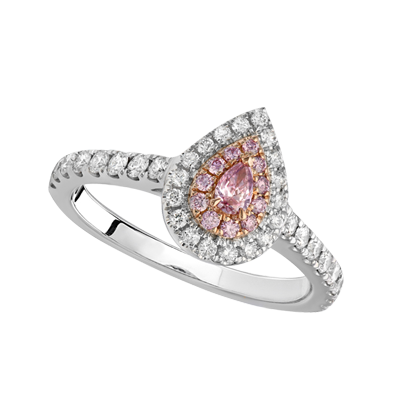 |
| Above: Pink Kimberley Diamonds |
Justin Linney, creative director of Linneys Jewellers in Perth, added, “Love must be in the air, as we have seen many couples getting engaged after restrictions were eased. Wedding ring sales are down given most weddings are being postponed – however this will change as restrictions are eased around interstate travel in particular.
“Wedding jewellery has still been surprisingly popular; there might be less weddings, but given the weddings that are taking place are being pared back, it seems people are more willing to spend on jewellery,” he added.
Stephen Dibb, director of Stephen Dibb Jewellery, which has three stores in Brisbane, also noted that average spend was up alongside overall jewellery sales.
“In terms of engagement and wedding rings, I think people are spending less elsewhere else – so they think ‘Why not treat myself for something I’m going to see every day and wear every day?’”
The smaller-scale wedding trend was noted by other suppliers, including Chris Worth, business development manager at Worth & Douglas, which supplies men’s and women’s wedding and engagement rings.
“While there may have been a delay on wedding ring purchases due to postponements and restrictions around larger gatherings, micro-weddings have taken their place in the meantime,” he said.
Peter Beck, director of Peter W Beck which is based in Adelaide, noted a “patchy recovery” in wedding jewellery sales since July 2020, explaining, “Couples have still gone ahead with their weddings with changed circumstances or have managed to have their wedding during periods of relaxed restrictions.
“Still, I anticipate the erratic rescheduling of weddings will continue taking place until the virus is eradicated.”
Internationally, Marty Hurwitz – director of market research firm The MVEye, formerly MVI Marketing – said, “It seems counter-intuitive, given the lives lost and families devastated, but COVID-19 was a boon for the wedding and engagement market.
“Many people had lots of money in their pockets and more savings – from less travel and eating out – and they clamoured for a strong emotional bond with those they couldn’t see in person.
“Jewellery clearly provided that bond. Jewellery sales were propelled by these factors and engagement ring sales and wedding planning were the main beneficiaries.”
Indeed, US newspaper the Washington Post reported in December that the Grand Canyon, one of the world’s most popular proposal locations, had seen its proposal package bookings double compared to the same period in 2019.
Popping the question
While the impact of COVID-19 on weddings can be measured with some degree of accuracy, the effect on engagements is harder to quantify.
Anecdotally, jewellery retailers and suppliers noted steady if subdued demand for rings throughout 2020 – with the exception of Victoria, which was subject to an extended ‘hard’ lockdown between July and October.
“The second lockdown was the real disaster,” Holdsworth confirms. “Stores were shut for months and the mental toll it had on people turned them away from wanting to do anything – lives seemed to be put on hold.
“However, we did see some engagement ring sales to people who proposed, trying to add a bit of sparkle to an otherwise glum outlook!”
Since the lockdown ended, Holdsworth says engagement ring sales have “returned to normal” – an observation echoed by Queensland-based Dibb, who told Jeweller sales were now on par with 2019 and early 2020 levels.
In Western Australia, Linney observes, “Engagements were put on hold when more serious restrictions were in place, but when they eased we experienced a spike in activity around engagement rings.”
Across Australia, Worth has observed a “surge in engagement ring sales”, explaining, “Forced time together – or apart – must have inspired people to commit!”
Notably, Wedded Wonderland’s survey – which comprised 839 brides-to-be – noted that the average engagement ring spend rose to $12,690 from $11,753 in the previous year’s survey, representing an 8 per cent increase.
 A number of explanations exist for this trend. Firstly, those who have chosen to proceed with weddings have scaled back their ceremonies considerably, and have simply redirected their funds toward jewellery.
A number of explanations exist for this trend. Firstly, those who have chosen to proceed with weddings have scaled back their ceremonies considerably, and have simply redirected their funds toward jewellery.
Jamie Singleton, president of Signet Jewelers – which operates US jewellery chains Kay, Zales, and Peoples, among others – says the company had seen “double-digit” increases in engagement-ring sales, with higher prices.
“The ring is more important than ever. As couples have smaller weddings or postpone them, they’re putting a little more of their budget in rings,” she told the Washington Post.
Meanwhile, in Australia, many consumers have experienced an increase in discretionary income due to a combination of government stimulus – income tax cuts and wage subsidies such as JobKeeper – as well as saving on other luxuries, such as travel.
Shah notes, “Compared to previous years, November and December saw a huge increase in demand for jewellery because people who would normally spend money on Christmas and school holiday travel – young couples and families – couldn’t do that in 2020. It appears they won’t be able to do so in 2021 either, so they are spending that extra money on jewellery and other luxury products.”
Wendy El-Khoury, director of Wedded Wonderland, believes that social media has also placed upward pressure on ring spending.
“The engagement ring has been, and always will be, a focal point [of proposals]. This has increased considerably year-on-year, you can thank #RingSelfie and Instagram for that.
“Moving forward we will find couples looking for more considered payment plans when it comes to the engagement ring purchase,” she says.
Tracking the trends
In terms of design, retailers and suppliers agree that the trend toward custom design continues to gain momentum, with Holdsworth observing, “We are noticing a far greater number of people wanting to have a close input into design – they want to see designs and CAD renders and insist upon the fine details of their items.”
Worth adds, “The trend for bespoke pieces has become more prevalent with more couples looking to find something truly special that reflects their tastes and suits their own styles, so we are seeing an increase in unique, custom CAD/CNC designs come through.”
Says Dibb, “The personalised experience is what jewellery in general, and engagement particularly, is all about. If you are going to have an oval halo – very popular – as an engagement ring, what are you going to do that makes it pop and be a little bit different and more personal? There’s plenty of scope to incorporate engraving, hidden stones, favourite colours, or references to the kids.”
Meanwhile, Linney notes a “heightened level of interest and custom orders for yellow gold jewellery for both pearl and diamond departments. Customers generally have a more flexible budget given the travel restrictions are in place so this is resulting in some wider and heavier pieces.”
For Holdsworth’s customers, “All white gold is not as important as it once was – yellow and rose are really popular. Fancy shape diamonds now make up about half our ring sales now and of course pink diamonds have had a surge in popularity.”
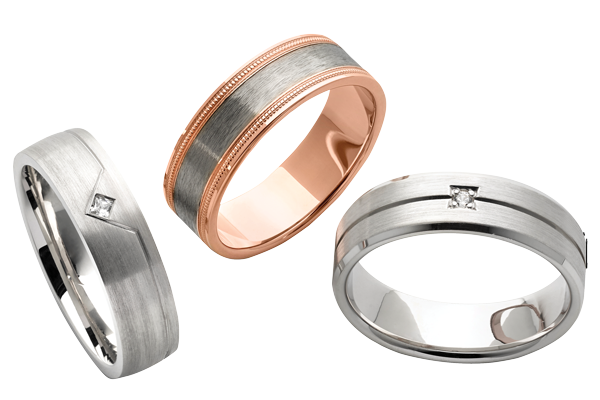 |
| Above: Worth & Douglas |
While Shah says the most popular shape for engagement diamonds is still the classic round, oval is the next most-popular and fancy shapes such as pear and cushion are gaining ground.
“Not only in Australia but worldwide, the oval shape is very popular after the round – I don’t know the exact reason, but some celebrities are going for the oval and people do like to follow that,” he explained.
White diamond was still the number-one gemstone for engagement jewellery, according to Shah, who like Holdsworth also noted an increase in demand for fancy colour diamonds.
“Because of the closure of the Argyle Mine last November, there is more demand for pink diamonds and blue diamonds,” he explains.
“We also have more demand for other colour diamonds – champagne, cognac, black, and yellow. Those colours are very consistent,” Shah said.
In the US, demand for lab-created diamonds “exploded in 2020”, according to Hurwitz, who says international markets are likely to follow this trend. “Coloured gemstones have also seen a boost as engagement ring centres, and I suspect both of these trends will continue in 2021,” he adds.
Notably, Bain & Company’s 10th annual report into the diamond industry, Brilliant Under Pressure: The Diamond Industry 2020-2021 found that the retail cost of lab-created diamonds had fallen to 35 per cent of a natural diamond, which will likely contribute to the increase in demand.
Locally, a preference for intentionally ‘mismatched’ bridal sets was noted by several retailers and suppliers, in terms of the design, metals, and gemstones.
Dibb says a number of his customers have chosen white gold engagement rings paired with a rose gold wedding ring: “Mixed metals give the set a very ‘designer’ look. When you mix metals, it shows a little more workmanship and care has been put into it,” he explains.
“Meanwhile we can create contrast with the design – pairing a claw-set engagement ring with a channel-set or grain-set wedding ring, for example – to keep the focus on the engagement ring, or give a simple solitaire a completely different look, whether it be Art Deco, very modern, or with old-world styling.”
More broadly, consumers continue to search for vintage and antique engagement rings and couples have also sought to include heirloom gemstones in their designs, likely reflecting broader trends for sustainability and unique products.
When it comes to wedding rings, a mix of tradition and modernity is preferred. “Wedding rings for both women and men are relatively stable in design, as a good wedding ring will be a timeless jewellery piece that will elegantly endure a lifetime of daily wear. Perennially popular designs have continued to stand out as the leading wedding ring choices for brides and grooms,” says Beck.
Worth notes demand for “simpler bands in platinum, white gold, yellow gold and our ZiRO black zirconium are popular for men, while diamonds set in gold or platinum for ladies remain very strong. The widths have also varied over the years, from up to 14mm down to the narrower 2-3mm widths sought after today.”
Meanwhile, Scanlan says men’s wedding ring trends are “always evolving”: “At the moment we’re selling a lot of platinum 950 and 600 because it’s a beautiful white metal and it’s well priced at the moment.”
“Black or dark metals are also popular, especially when they’re combined with yellow or rose gold,” he adds. “Carbon fibre continues to sell well and Dora’s latest release, tantalum, is another nice dark metal with a lovely weight that is already getting good results.”
For Shah, the trends in weddings and engagements across 2020 simply reflect the enduring appeal and significance of jewellery: “Diamonds and gemstones, gold, everything – they are all connected with emotion, so there was, is, and always will be demand,” he explains.
Indeed, even an international pandemic could not quash the love people have for each other – nor stop them from expressing that love with treasured jewellery.
AISLE BE THERE: RingING IN THE LOVE
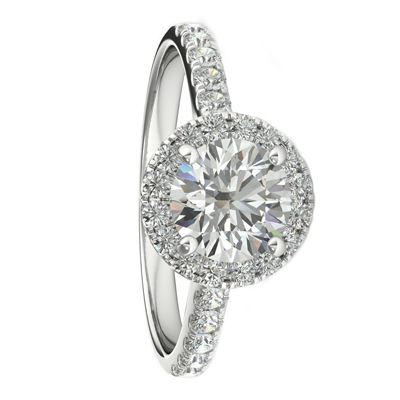 | 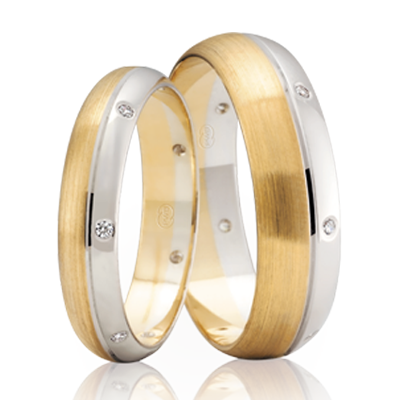 | 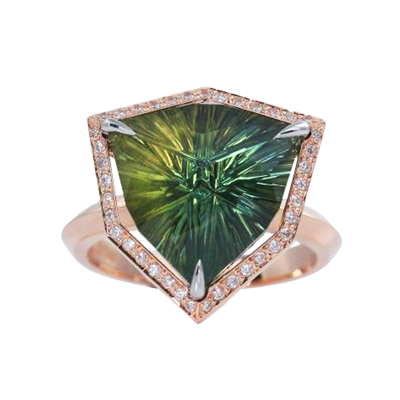 |
| Above: World Shiner | Above: Peter W Beck | Above: Murazzo Jewellers |
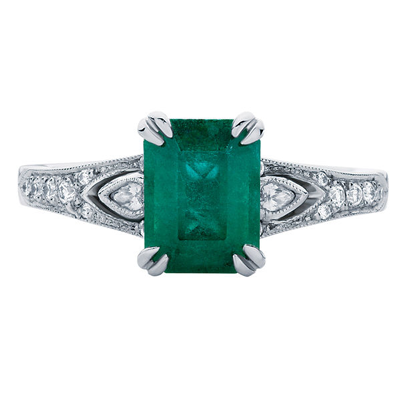 | 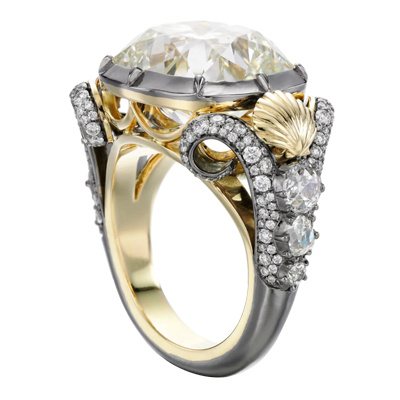 | 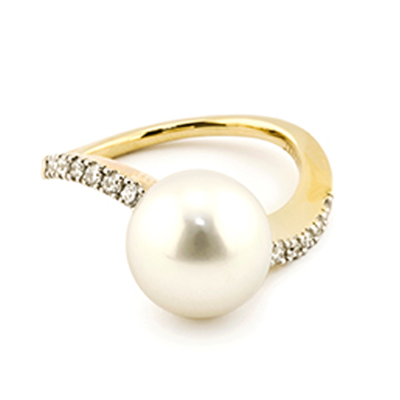 |
| Above: Larsen Jewellery | Above: Jessica McCormack | Above: Ikecho |
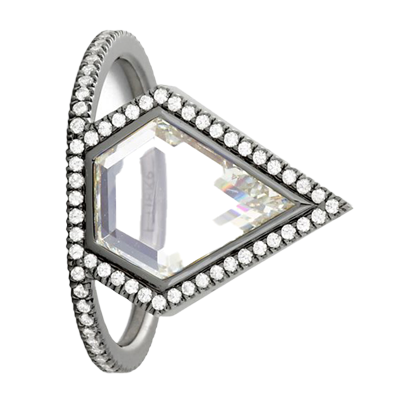 | 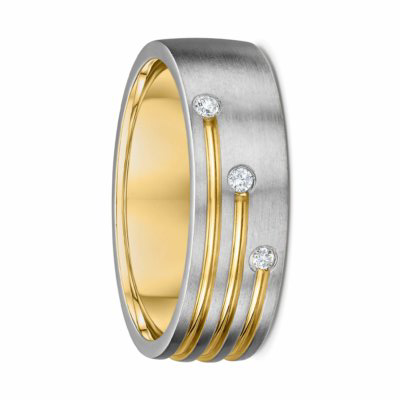 | |
| Above: Eva Fehren | Above: Dora | |
Read eMag
Hover over eMag and click cloud to download eMag PDF